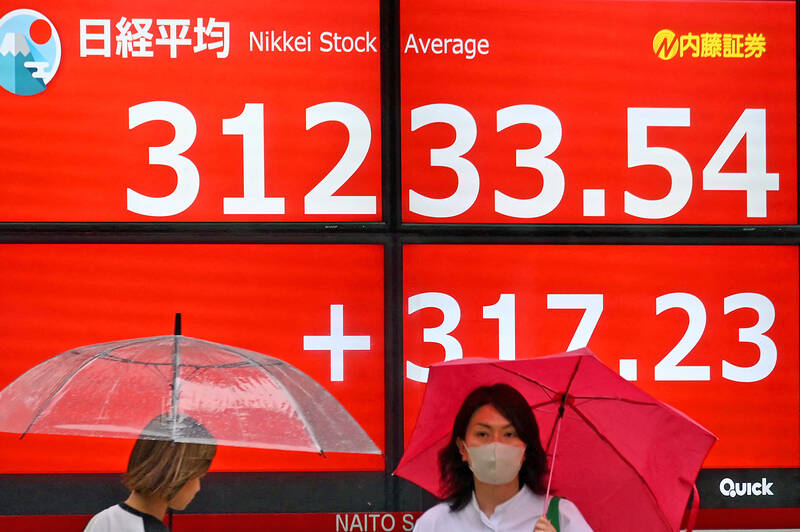Japan’s Nikkei 225 yesterday rose to its highest level since July 1990, buoyed by optimism over a US debt ceiling deal and a weaker yen.
However, a gauge of Chinese shares traded in Hong Kong inched closer to a bear market as a wobbling economic recovery, intensifying geopolitical tensions and a weaker yuan kept investors away.
In Tokyo trading, Softbank Group Corp jumped more than 8 percent as shares of Japanese chip-related companies continued to outperform amid the artificial intelligence (AI) euphoria that also propelled Wall Street peers.

Photo: AFP
The Nikkei surged as high as 31,560.43 within the first 10 minutes of trading, although gains were capped over the course of the day as the index closed up 1.03 percent at 31,233.54.
Softbank Group continued to push higher throughout the day, driven by news that British subsidiary Arm Ltd had rolled out a new chip technology that Taiwanese chipmaker MediaTek Inc (聯發科) would adopt in its next-generation products.
Shares of Advantest Corp, the chip-testing equipment maker that counts Nvidia Corp among its clients, climbed more than 4 percent, taking gains over the past three sessions to nearly 26 percent.
“The trigger for everything was Nvidia,” Sumitomo Mitsui DS Asset Management Co chief market strategist Masahiro Ichikawa said.
The Nikkei is easily swayed by moves in big tech stocks, relative to the broader TOPIX, which finished the day up 0.69 percent at 2,160.65.
Lifting the mood across the Japanese market early on, US President Joe Biden on Sunday said that he had finalized a budget agreement with US House of Representatives Speaker Kevin McCarthy and the deal was ready to move to the US Congress for a vote.
The MSCI Asia Pacific Index of regional stocks also climbed as sentiment improved on the US debt ceiling deal, but the Hang Seng China Enterprises Index (HSCEI) slumped as much as 1.3 percent, taking its losses from a Jan. 27 peak to more than 19 percent.
Meituan (美團) was the biggest drag amid concerns that increased competition would dent the e-commerce firm’s profitability.
The grim milestone is approaching as China’s post-COVID recovery loses momentum and earnings fall short of high expectations. Investors say the market lacks catalysts for a rebound as frictions with the US on issues from technology to Taiwan keep sentiment in check.
The HSCEI has erased about half of the gains seen during a three-month reopening rally through January. Down more than 6 percent this year, it is among the worst performers in Asia.
China’s onshore CSI 300 Index fell as much as 0.8 percent, after having erased all of its gains for this year last week amid a weaker yuan and developers’ debt woes.
Meituan shares tumbled as much as 8.4 percent to their lowest level since October last year. That more than offset a rally in NetEase Inc (網易) and Baidu Inc (百度) shares, and caused the Hang Sang Tech Index to reverse an early advance.
“Investors will only return in a meaningful way when concerns about geopolitics and broader economic recovery are allayed,” Union Bancaire Privee senior analyst Ling Vey-sern (凌煒森) said.

TAKING STOCK: A Taiwanese cookware firm in Vietnam urged customers to assess inventory or place orders early so shipments can reach the US while tariffs are paused Taiwanese businesses in Vietnam are exploring alternatives after the White House imposed a 46 percent import duty on Vietnamese goods, following US President Donald Trump’s announcement of “reciprocal” tariffs on the US’ trading partners. Lo Shih-liang (羅世良), chairman of Brico Industry Co (裕茂工業), a Taiwanese company that manufactures cast iron cookware and stove components in Vietnam, said that more than 40 percent of his business was tied to the US market, describing the constant US policy shifts as an emotional roller coaster. “I work during the day and stay up all night watching the news. I’ve been following US news until 3am

UNCERTAINTY: Innolux activated a stringent supply chain management mechanism, as it did during the COVID-19 pandemic, to ensure optimal inventory levels for customers Flat-panel display makers AUO Corp (友達) and Innolux Corp (群創) yesterday said that about 12 to 20 percent of their display business is at risk of potential US tariffs and that they would relocate production or shipment destinations to mitigate the levies’ effects. US tariffs would have a direct impact of US$200 million on AUO’s revenue, company chairman Paul Peng (彭雙浪) told reporters on the sidelines of the Touch Taiwan trade show in Taipei yesterday. That would make up about 12 percent of the company’s overall revenue. To cope with the tariff uncertainty, AUO plans to allocate its production to manufacturing facilities in

Six years ago, LVMH’s billionaire CEO Bernard Arnault and US President Donald Trump cut the blue ribbon on a factory in rural Texas that would make designer handbags for Louis Vuitton, one of the world’s best-known luxury brands. However, since the high-profile opening, the factory has faced a host of problems limiting production, 11 former Louis Vuitton employees said. The site has consistently ranked among the worst-performing for Louis Vuitton globally, “significantly” underperforming other facilities, said three former Louis Vuitton workers and a senior industry source, who cited internal rankings shared with staff. The plant’s problems — which have not

COLLABORATION: Given Taiwan’s key position in global supply chains, the US firm is discussing strategies with local partners and clients to deal with global uncertainties Advanced Micro Devices Inc (AMD) yesterday said it is meeting with local ecosystem partners, including Taiwan Semiconductor Manufacturing Co (TSMC, 台積電), to discuss strategies, including long-term manufacturing, to navigate uncertainties such as US tariffs, as Taiwan occupies an important position in global supply chains. AMD chief executive officer Lisa Su (蘇姿丰) told reporters that Taiwan is an important part of the chip designer’s ecosystem and she is discussing with partners and customers in Taiwan to forge strong collaborations on different areas during this critical period. AMD has just become the first artificial-intelligence (AI) server chip customer of TSMC to utilize its advanced